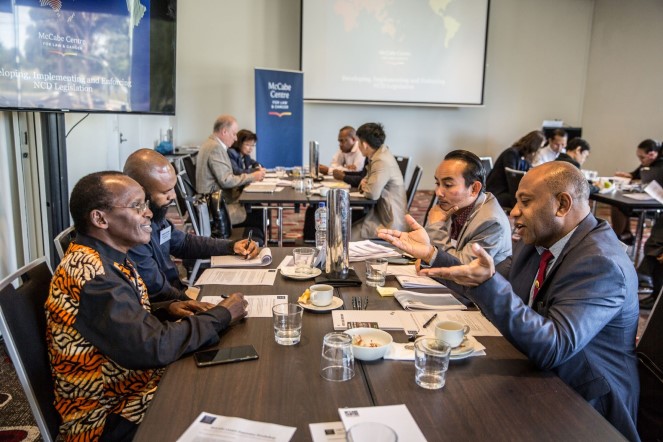
Today, on the 20 th anniversary of World Cancer Day and the McCabe Centre for Law & Cancer’s eighth birthday, we reflect on the global momentum on Universal Health Coverage and its potential to address the cancer burden and inequalities in cancer worldwide.
Grounded in the fundamental human right of every person to enjoy the highest attainable standard of health, Universal Health Coverage (‘UHC’) means that all people have access to the quality, essential health services that they need across the life-course ¾ promotive, preventative, curative, rehabilitative and palliative health services ¾ without enduring financial hardship.
UHC has been a longstanding tenet of global health and is target 3.8 of the Sustainable Development Goals. In September 2019, world political leaders recommitted to realising UHC by 2030 by adopting the first Political Declaration on Universal Health Coverage at the United Nation’s first High-Level Meeting on Universal Health Coverage. The Political Declaration commits all UN Member States to expanding quality health services to one billion more people by 2023 and all people by 2030. It identifies key action areas to frame the political objectives, guide implementation and accelerate action toward UHC and some targets to track progress.
Progress on UHC is good news for the estimated 18.1 million people diagnosed with cancer annually, particularly given that equity in healthcare is at the heart of UHC. Significant inequities in cancer currently exist within and between countries. For example, approximately 70 per cent of the 9.6 million lives lost to cancer each year occur in low- and middle- income countries that are least equipped to manage it.
Across the world, marginalised, disadvantaged and vulnerable people face poorer cancer outcomes. Out-of-pocket costs for cancer treatment and care are pushing too many into poverty and/or financial hardship, even in high-income countries. These inequities across the cancer continuum reflect broader social and economic factors that impact health.
Access to cancer prevention and control measures should be equal for all – no matter who you are, where you live, your gender, ethnicity, or level of income. UHC provides a rallying point to address this. That is why UHC presents a significant opportunity for cancer patients globally. By implementing resource and country appropriate strategies on cancer prevention, screening, and treatment 3.7 million lives every year can be saved.
Building on the Political Declaration, national leaders can put their commitment to UHC into action and incorporate addressing cancer into their national UHC plans. Many countries have already commenced this journey, but many are also grappling with the complexities and practicalities of progressing towards UHC — how is this to be achieved?
Effective law and regulatory measures are essential to realising UHC. Law is a powerful tool in advancing UHC and addressing the inequitable cancer burden by addressing the underlying social determinants of health underpinning these inequities. Law also occupies a central place in health system design; implementation and governance; the delivery of healthcare across the continuum; health promotion and disease prevention and control.
Advancing UHC requires a range of actors and institutions to collaborate effectively to share knowledge, skills and networks to convert political will into the implementation of effective interventions. The McCabe Centre is committed to collaborating for UHC.
Several countries have already harnessed the power of law and regulation to reduce the cancer burden and the McCabe Centre has been part of this journey. Over the past eight years, we have worked with more than 20 countries on developing and defending tobacco plain packaging laws around the world. Alumni from our International Legal Training Program have led the development of tobacco control legislation and regulations around the world including in Ghana, Guyana, Liberia, Malaysia, Niue, Papua New Guinea, the Philippines, Samoa, Sri Lanka and Thailand, and are progressing evidence-based and effective public health laws in many other countries. Through the Cancer Advocates programme run by our key partner, UICC, we mentored the Cancer Warriors Foundation Inc in the Philippines in its successful role in the Implementing Rules and Regulations for the National Integrated Cancer Control Act which will lead to improved cancer outcomes.
By working together, we can reduce the devastating burden cancer imposes on people and the communities in which they live.
Progress is possible.
Today, there are 43.8 million people alive within 5 years of a cancer diagnosis. UHC can help us give everyone a better chance with equal access to cancer prevention and care for all. Harnessing the law to advance UHC is a crucial part of this process.